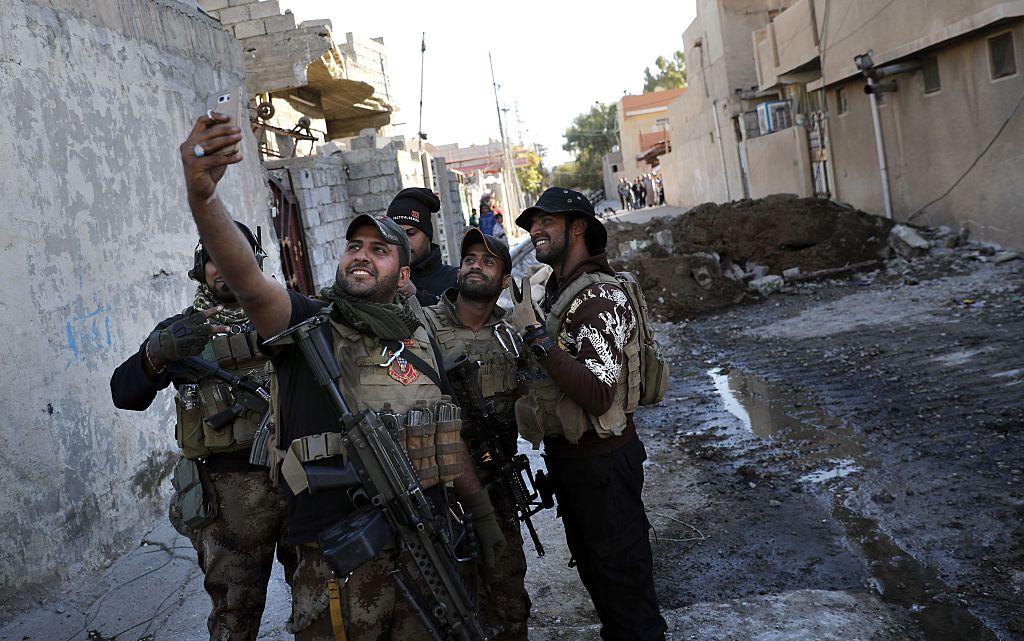Mosul battle: How the fight against Isis is being reported through victory selfies and Facebook statuses
New trend in frontline ‘victory selfies’ and videos make war more immediate than ever before, providing Iraqi civilians with live updates on frontline action

When the battle to retake Mosul from Isis began last month, many were unnerved by the idea that the war was being livestreamed through Facebook.
While the feed is no different from live broadcast news, the ability to send reaction emoticons as pictures of tanks roll through the Nineveh plains is a decidedly 21st-century development in how we understand conflict.
The fight against Isis may look strange broadcast via Facebook Live to those far away but for Iraqis close to the fighting, soldiers on the ground posting to social media is often beating traditional news sources as their first port of call for what’s happening.
Commanders and troops in the Iraqi coalition are increasingly posting online updates on their whereabouts, including videos of them walking through newly liberated towns, destroying Isis flags and paraphernalia as they go, or accounts of what happened during the day.
There’s also a new trend in ‘victory selfies’ – some taken from the cockpits of F-16 fighter jets, standing over captured fighters, or after surviving a car bomb – which frequently go viral on Iraqi social media networks.
Since soldiers take their internet-enabled and camera phones to the frontlines in greater numbers than they used to, someone following army-related Facebook pages and Twitter accounts will get a sense of how operations are unfolding before the Iraqi government or news agencies get a chance to report the day’s developments.
"In war zones, people often use social media as a primary source of information," Dr Jean-Marc Rickli, a research fellow at King's College London and the Geneva Centre for Security Policy told The Independent.
"Of course it is biased, but if you know which accounts to follow you can often get information before news breaks it," he said.
There is little danger of giving away positions through geo-tagging or careless posts, since Isis is on the defensive in the fight for the city.
Some high-ranking commanders are using this to their advantage, amassing thousands of followers on their private social media accounts as civilians eagerly await pictures of operations or their take on the latest Isis video, offering praise, questions and criticism in comments which can number in the hundreds.
Major General Fadhil Jamil al-Barwari, head of the elite Golden Brigade, is particularly adept at sharing morale-boosting pictures.
“This is a victory selfie with a young man in liberated Bartella, and soon we will be in the centre of Mosul,” he posted after the Christian town was retaken.
First Lt Gen Taleb Kanani Hgati, too, is his own PR adviser, posting interviews and progress updates, sometimes many times a day.
Of course, just because an army general posts a Facebook status seen by thousands of people doesn’t mean what they said is accurate; the debate over how social media spreads fake news and information is in full swing following the shock US election victory of Donald Trump.
But social media is becoming an inherent part of international conflict, Dr Rickli said. So much is now posted every day it is as powerful a force as any in shaping perceptions and defining shared values – as Isis’ savvy grasp of social media would suggest.
“Propaganda or so-called 'psy-ops' is not a new phenomenon in warfare to shape opinions and influence outcomes,” Dr Rickli wrote.
However, he noted, states have much less control of narratives than they used to, for better or worse.
Not all of the posts from the battle for Mosul have been positive: civilians have uploaded videos of rough treatment at the hands of Iraqi soldiers and the aftermath of crimes against humanity committed as Isis falls back towards the centre of the city or flees to the caliphate’s de facto capital of Raqqa in neighbouring Syria.
The bottom line, Dr Rickli says, is that anyone can now shape their own story on social media. As of the third quarter of 2016, Facebook had 1.79 billion monthly active users.
“Individuals and non-state actors have become, to a much greater degree, thanks to the digital revolution and the growing importance of social media, also creators of meaning,” he wrote.
Join our commenting forum
Join thought-provoking conversations, follow other Independent readers and see their replies
Comments